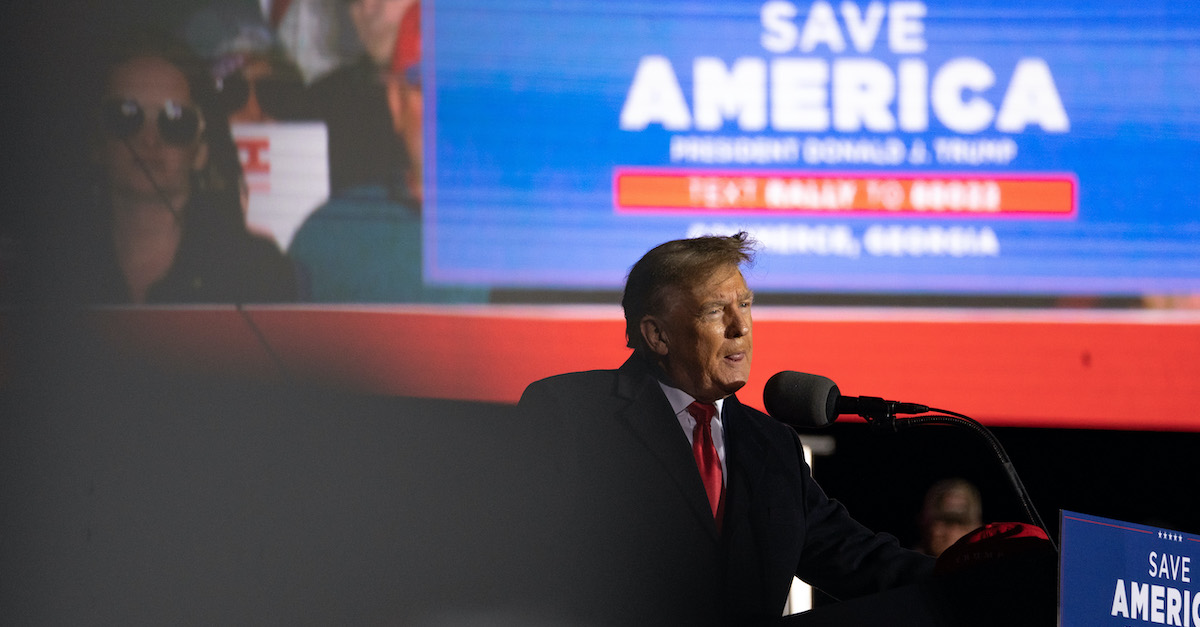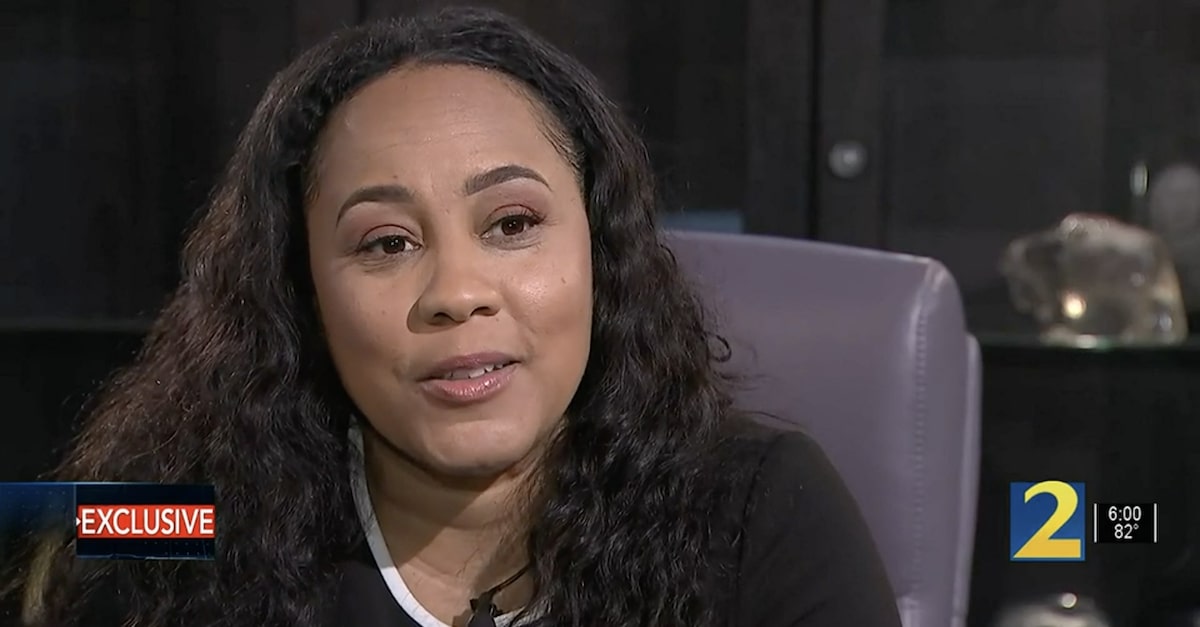
Ex-President Donald Trump stands in front of a sign promoting his Save America PAC at a rally at the Banks County Dragway on March 26, 2022 in Commerce, Ga. (Photo by Megan Varner/Getty Images)
Listen to the full episode on Apple, Spotify or wherever else you get your podcasts, and subscribe!
When a Georgia prosecutor revealed “decisions are imminent” on whether to charge former President Donald Trump and others with 2020 election-related crimes, she appeared to many to suggest multiple indictments are forthcoming. Fulton County District Attorney Fani Willis (D) urged a judge not to release a special grand jury’s report and charging recommendations, in part, to protect the fair trial rights of the accused.
“In this case, the state understands the media’s interest and the world’s interest — but we have to be mindful of protecting future defendants’ rights,” Willis declared on Tuesday.
Parsing the DA’s remarks in a wide-ranging interview, ex-federal prosecutor Renato Mariotti showed little doubt that Willis would put Trump on any future indictment. Mariotti, who prosecuted white-collar crimes for nearly a decade with the Northern District of Illinois, is a frequent television commentator and the host of the podcast “It’s Complicated.”
“I am not surprised at all that charging decisions are imminent because it certainly has appeared to me for quite some time that she is already determined that she’s going to indict Donald Trump,” Mariotti said on Law&Crime’s podcast Objections: with Adam Klasfeld.
“Like a Crime Boss or Kingpin”
In a wide-ranging interview, Mariotti noted that Willis has not been shy about taking to the TV airwaves to comment — albeit, obliquely — on the former president.
“People seem to think that in society that there [are] certain people who are immune to prosecution, if you are a celebrity, if you are a high-ranking public official,” Willis told NBC. “I guess there’s something strange with me. Lady Justice is actually blind.”

Fulton County District Attorney Fani Willis interview with WSBTV. (Screenshot via WSBTV)
If Willis does move ahead with such cases, Mariotti cautioned against using one possible prosecutorial arrow in her quiver that has gotten widespread attention: Georgia’s Racketeer Influenced and Corrupt Organizations (RICO) Act.
As noted by the Brookings Institution, the statute would allow prosecutors to punish any attempts to subject the election like an “enterprise.”
“While the term ‘RICO’ conjures up prosecutions of Mafia bosses, the statute is much broader than that,” the think tank noted in a report. “It recognizes that if violations of individual criminal statutes by a single person are bad, an enterprise that repeatedly violates the law is worse and should be subject to additional sanction.”
In the context of the 2020 election, Brookings believes the statute could confront a multi-pronged effort to overturn the election results in Georgia, including Trump’s pressure on public officials like Secretary of State Brad Raffensperger (R) and the scheme to have fake electors sign false statements. Brookings noted that Willis reportedly hired a RICO expert for her investigative team.
Mariotti, however, says that beyond the statute’s mystique comes unique challenges.
“I think there’s this belief that Trump is like a crime boss and kingpin — and this and that — and that essentially, all you need to do is just put it all out there, and that will be evident,” Mariotti said. “What I would just say to the public is that white-collar crimes can be very difficult to prove.”
“Complicated and Unwieldy”
The choice before Fulton County prosecutors right now, in Mariotti’s view, is whether to pursue a “narrow indictment” or a “wide indictment.”
“As a federal prosecutor, we were usually looking for reasons not to charge RICO because it was so complicated and unwieldy to prove,” noted Mariotti, adding that they would even avoid the charge in cases involving a “big drug kingpin” or a “street gang leader.”
“What we would often do is just charge the person with a drug conspiracy, prove that up,” Mariotti said. “That’s much more straightforward, and then, tell the judge about all this other awful stuff at sentencing.”
As Mariotti sees it, any case against Trump would be challenging to begin with, given the “word salad” of the former president’s telephone conversation with Raffensperger.
“You’re already taking on something that’s difficult, prosecuting a former president for conversations that are more or less a word salad, as far as I’m concerned — and contain things that that are both helpful and hurtful to the defense — and so why try to add to that burden by having more hoops to jump through?” he asked.
During that phone call, Trump asked Raffensperger to “find” 11,780 votes, just the margin needed to swing the election in his favor in Georgia. The former president also appeared to threaten Raffensperger and his general counsel Ryan Germany with prosecution if they refused to comply.
“It is more illegal for you than it is for them because you know what they did and you’re not reporting it,” Trump told Raffensperger, according to a transcript of the conversation. “That’s a criminal, that’s a criminal offense. And you can’t let that happen. That’s a big risk to you and to Ryan, your lawyer.”
But that conversation, Mariotti said, was lengthy and will be extensively litigated.
Rather than snatching defeat from the jaws of victory, Mariotti said that statutorily complicating the case could turn a “50-50 shot into a 30-70 shot or something.”
On the podcast, Mariotti also chimes in a federal judge’s nearly $1 million sanctions against Trump and his lawyer — and what the discovery of classified documents in the homes of President Joe Biden and former Vice President Mike Pence could mean for special counsel Jack Smith’s probe.
Listen to the full podcast below.